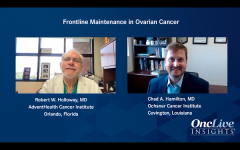
Ovarian Cancer Maintenance Therapy: Olaparib vs. Niraparib
Key opinion leaders discuss how they decide between two regimens for ovarian cancer maintenance therapies.
Episodes in this series

Chad A. Hamilton, MD: I won’t throw this as a question to you, but for my folks that maybe have come out of their primary chemotherapy and have a lot of bone marrow toxicity and their platelets are low, maybe that’s a group that I would lean more towards the olaparib [Lynparza] side of things. What other things make you differentiate 1 versus the other?
Robert W. Holloway, MD: You hit on it with a toxicity issue with bone marrow. Clearly, you have to consider how they tolerated their cytotoxic therapy and how their bone marrow reserve was. If you’ve got a patient that had repetitive episodes of thrombocytopenia, then I would be a little more concerned about niraparib [Zejula]. But if you’re going to use it, then you’re going to be waiting 6 to 8 weeks before you start it, most likely, which in a setting like this with a partial response, I’d be a little concerned about. I want to get them onto something and keep them maintained as quick as we can to not allow them to progress. This patient is most unusual, and obviously, these are made up examples, but if I really had a patient like this who had persistent disease, I’d be asking why they weren’t completely resected and where was the disease. If I did the surgery, I would know that, but if I didn’t do the surgery, I’d want to know. If I was told that it’s distal small bowel, and if that’s really her site of residual disease in a patient who’s BRCA mutated like this, it’s going to inhibit their ability to take any kind of maintenance therapy, so I would almost consider thinking about going back and correcting our GI [gastrointestinal] issue to make her quality of life better, and then get on with more effective therapy if we could. Now if it’s multi-site disease, I certainly wouldn’t do that. And she’s just a nonresponder or less than optimal responder who’s got a poor prognosis, unfortunately, even though she is BRCA mutated.
Chad A. Hamilton, MD: We had we just had to throw you a little bit of a curveball here. We couldn’t just have the standard textbook case for you. I think your point about not all these mutations are the same and not all these patients are going to behave the same is really salient. I think that, particularly in terms of how the HRD [homologous recombination deficiency] test is really looking for evidence of these DNA editing challenges in the patient’s tumor, so we’re not really getting either “yes” or “no” for if it’s there. I think our friend Dr. Coleman [Robert L. Coleman, MD, FACOG, FACS; Chief Scientific Officer, US Oncology Network] described it well that the HRD testing, in a lot of ways, sees the smoke and doesn’t necessarily see the fire that’s there. So I do think we have a little way to go in refining our HRD testing to determine better ways of acquiring this information. Is our LOH [loss of heterozygosity] score going to be equivalent to genomic instability, or equivalent to the other testing that’s out there? I just don’t know. I think it continues to evolve, and I think what we do in 2 and 5 years is going to be a little bit different from what we do now. Hopefully, we will continue to get better and better biomarker guidance as to how to treat these patients. I’m just glad that we have something at this point that is so remarkably different than we did 5 years ago to help us guide treatment in these patients. It has been, certainly for ovarian cancer, one of the most dramatic changes that I’ve seen in my career. I am a big proponent of testing, and for a good number of patients, I think maintenance therapy is the appropriate treatment.
Transcript edited for clarity.







































